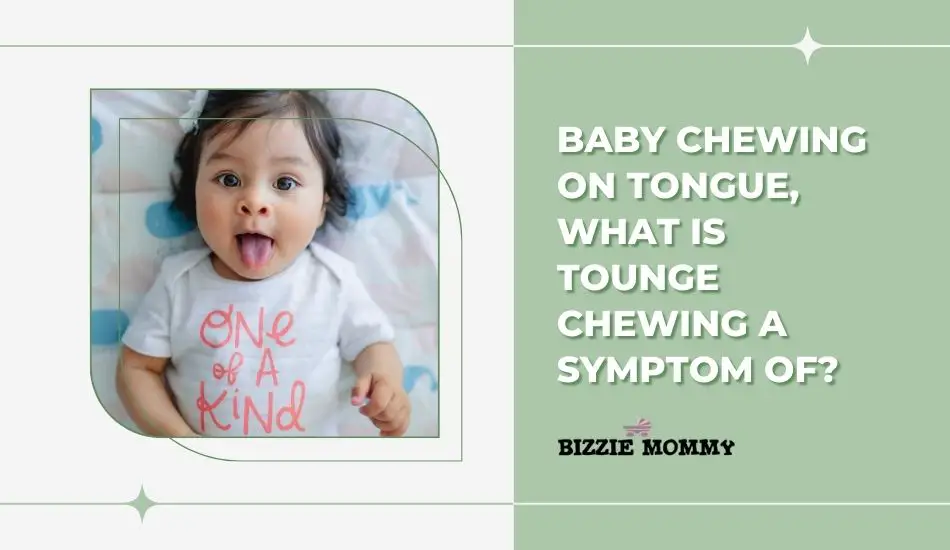Your baby doesn’t let you have any respite, does he? As a parent, you try to do everything right, but when you notice that your baby is chewing his/her tongue, it may seem as if it is because of your negligence somehow, or perhaps something is wrong. There is no manual for raising kids the right way, and there certainly is no popular advice about that.
You google the situation, and instantly, you find out it is one of the symptoms of autism. At this point, you may be convinced that your baby has a neurological disorder, and you may feel panic crawl up your spine. But tongue-chewing is a relatively common condition in babies.
Before you freak out, know that it is not abnormal, and you can easily put a stop to it. For your sake, we have compiled a list of all the things you can do to stop your baby from tongue-chewing.
Why Does My 2-Month-Old Chew Her Tongue?
If your newborn is chewing on her tongue, it may be because of her sucking reflex. Babies cannot consume anything solid; therefore, they are only aware of sucking, which is what they do with their tongues.
Baby chewing on the tongue is not serious unless your baby harms herself. It is clear that if the tongue-chewing caused any pain to the baby, she would never do it. She would cry out the moment it got painful. Therefore, the activity in itself is quite harmless, but you can never rule out the possibility of accidental tongue bites. However, minor tongue bites may be a blessing in disguise as they may cause your baby to never chew her tongue again. She will be far too scared to do so.
In short, tongue-chewing allows your baby to discover and becomes aware of her body. As she grows, she learns more and more about herself. It is a sign of developmental progress, and you shouldn’t be scared. Instead, you should be proud that your baby is trying to learn and discern things around her.
How Do I Stop My Baby From Chewing On His Tounge?
Even when you know that tongue-chewing may not be a cause of concern nor an indicator of any underlying chronic condition, you may still worry. As a parent, you may wonder how to stop your baby’s tongue-chewing habit as soon as possible. Many parents panic and attribute this behavior to poor muscle tone. However, poor muscle tone is seldom a reason behind it.
Your baby is most likely fine. A tongue-chewing habit is nothing to be intimidated by, and you can help your child overcome it. Before you jump to any self-diagnosed conclusions, try the following tips to dissuade your baby from this habit.
1. Feed your baby
The tongue plays a vital role in allowing the baby to feed properly. Babies become quite habitual in the sucking reflex, but at times they are actually hungry and want you to feed them. You will see a marked reduction in tongue-chewing when you feed them.
2. Try solid food
Tongue-chewing can be relatively reduced if the baby starts eating solids. Babies chew their tongues to show they are ready to have a real meal. Usually, when babies are four months old, they can start having soft solid foods.
3. Offer a teether
Your baby’s tongue-chewing may indicate that they are experiencing teething pain. Teething pain can be reduced in several ways, including chewing on the tongue. Consider it a normal development and support your baby tongue-chewing until his pain is lessened.
4. Use a pacifier
Tongue-chewing is usually due to a baby’s sucking reflex as they are used to sucking while eating. They need something to suck on. As newborns can’t put their fingers or thumbs in their mouths, they resort to tongue-chewing to satisfy their habit.
You can break this habit by putting a pacifier in the baby’s mouth. Once they have something else to chew on, they will give up tongue-chewing.
5. Maintain a feeding schedule
Tongue-chewing may result from a disturbed feeding schedule. If you don’t feed your baby at a specific time, he will chew his tongue out of hunger. Maintain a schedule and try not to diverge from it.
6. Relax
Consider tongue-chewing a normal developmental milestone and wait patiently until baby abandons the habit on his own. This is a developmental milestone because the baby is discovering his mouth. He feels he has a tongue. If he is becoming aware of his body, try not to get in his way. The habit will eventually end on its own as the baby grows.
Baby Sticking Tongue Out

Babies often stick out their tongues; so do adults when they try to cheer up a baby. Nothing odd about that, right? Well, other than fun, babies stick out their tongues for several reasons. And very few of those reasons are worrisome, if at all!
Oversized Tongue
If your baby is sticking out his tongue, he may have an abnormally large tongue. Some babies genetically have oversized tongues. They can’t seem to keep it inside their mouths. They learn to keep it in as they grow up, but can you blame them for putting it out as a baby?
It’s absolutely fine if the baby sticks out his tongue unless he accidentally bites it. Similarly, the baby’s mouth can also be relatively small, causing him to push his tongue a bit out of his mouth.
Natural Reflexes
As mentioned before, when babies appear to chew their tongues, they are really just sucking it. This sucking reflex or tongue thrust reflex (where the tongue appears to be sticking out of the mouth) is natural, showing the baby is hungry. You should feed the baby often to ensure he doesn’t stick his tongue out.
For Fun
Babies stick out their tongues by imitating adults. If an adult plays with him and sticks out his tongue, he will instantly copy it. Babies use tongue-sticking to communicate, showing they understand the other person’s meaning.
Hungry or Full
Babies stick out their tongues to either show they are hungry or have had enough food. If the baby is hungry, why isn’t he crying? Pediatricians have found that babies cry as a last resort to show they are hungry. Before that, there are always numerous other signs, and sticking the tongue out is one of them.
Tummy Issues
It is most likely that your baby is having gas or other tummy issues if he sticks out his tongue often. Either this or they are releasing gas which is quite normal as babies digest food this way. Babies may make other faces in addition to sticking out their tongues to show they are having tummy issues.
General Baby Teething Tips
Teething is one of the most difficult times of a baby’s life. The teething pain makes the baby restless and uncomfortable. Most babies start teething when they are between four and seven months old. If your baby is in that age group and consistently chews his tongue, it indicates his teething period has started.
Symptoms of Baby Teething
Teething is extremely painful, and your baby chews his tongue to relieve some of his pain. Other than tongue0-chewing, teething pain may be accompanied by:
1. Excessive Drooling
Babies drool a lot, but during the teething process, the drooling becomes excessive, to the extent that rashes can develop on their faces, especially around their mouths. It will help if you try to keep the baby’s mouth as dry as possible. Wipe it often. Use a cool, wet paper towel to keep your baby’s mouth clean.
2. Crying
Babies cry more than usual during teething because they are in immense pain. This, along with moodiness and restlessness, is one of the main signs of teething.
3. Lack of Sleep
Babies have restless nights due to teething pain. They sleep less, which makes them cranky. Teething also affects daytime naps. The pain, accompanied by lack of sleep, makes your baby weak and moody.
4. Gum Inflammation
When you see restlessness in your baby, check his gums. If he has swollen gums, they clearly show that the baby has entered the teething process. The gums will be red and swollen and cause a burning feeling.
5. Fever
Fever also occurs along with teething pain. Along with fever, baby may also experience an upset stomach and may pass stool often. At this stage, you can contact your doctor for advice.
Relieving Teething Pain
If you want your child to stop tongue-chewing while he is teething, you need to follow these tips to relieve your baby’s pain:
Gum Massage
Older babies who are in the teething phase need gum massage to reduce teething pain. It is as simple as it sounds. It would be best if you used a clean finger to rub the teething gums. You can do this when you apply pain relief ointment.
These days you can also get a gum massager in any baby shop. Just put it on your finger and place it on the baby’s gums for an automatic massage. Easy peasy.
Give a Cold Teething Object
While teething, swollen gums cause immense agony to the baby. A cold teething ring, a cold, wet washcloth, or any other old object can work like a balm on the aching baby gums. The heat, swelling, and inflammation that babies feel on their gums can be reduced by chewing on a cold teether as it tones down the burning feeling in their gums and calms them.
You can freeze teething toys, too, and place them on the baby’s gums for immediate relief. They provide immediate relief because their coldness instantly numbs the gums.
Make sure the teething toys you use are safe and certified by doctors.
Using cheap plastic and low-quality toys will worsen your baby’s condition and shouldn’t be put into baby’s mouth as they can have adverse effects on their health later on. Furthermore, if the toy is low-quality, it will quickly break and may get stuck in the throat, making him choke. This is life-threatening.
Consult your Pediatrician
If nothing soothes your baby’s pain, you should let your pediatrician take over. He will prescribe a few meds, such as Tylenol or ibuprofen, to relieve the pain. Some meds also induce sleep so that your baby sleeps better and wakes up less cranky than usual.
Make sure you have tried everything at home before you jump at the first opportunity of visiting your doctor.
Quick Review
Baby chewing on his tongue is not a habit to be encouraged; however, you shouldn’t feel distressed by it either. In severe cases, you need to consult a pediatrician. Before it comes to that, you can correct it in no time if:
- You give him a pacifier. His sucking action will move from tongue to pacifier.
- You give him solid foods as he can now chew.
- You observe his gums. If he is teething, help him overcome the pain, and he will stop chewing.
Your baby will eventually leave this habit behind as they grow.

